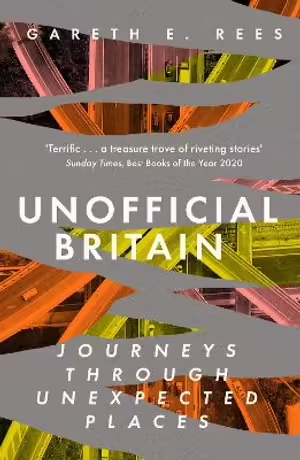We have lived for over seventy years in a world of motorways, roundabouts, high-rises, cooling towers, malls and pylons. They are part of a century that is already way behind us, slipping quickly into history. The structures that we think of as ‘modern’ are in fact analogue relics of a bygone era before digital technology, mobile phones and the internet. Generations have lived and died among them, played among them, attached memories to them… They have been around long enough to be layered with stories as they gradually decay… However mundane or brutal they might be, these are places we remember, in which our daily dramas unfold…Inside each of us is a rich anthology of tiny , yet meaningful moments, played out in locations that have acquired dramatic qualities as a result – the hospital, the shopping centre, the service station, the cul-de-sac, the tumbledown wasteland.
I picked this book up for $1 at the last library sale. Bargain! It’s so good to read something that makes you look at your world in a new way. Or in my case, remember that I can. Gareth Rees travels to the overlooked places of Britain and finds magic and mystery in the most unexpected places. He finds people who are strangely drawn to electricity pylons, who believe that ring roads and roundabouts are ‘energy circles’, that housing estates and motorways can be haunted by the deep past or by recent tragedies, that the edgelands of industrial estates are ‘thin places’, where strange beasts roam and urban legends begin. Unofficial Britain is grimy, grotty, littered, decaying; the reverse of ‘Heritage Britain’ of stately homes and picturesque villages and meandering streams. But Rees makes the point that because Britain has been inhabited for thousands of years, the present-day built environment is constructed on top of a timeline of structures ranging from Neolithic grave sites to Medieval monasteries to Victorian slums. And the inhabitants have all left traces of gods, ghosts and demons.
British children’s writers have been especially good at exploring the myth and magic of this layered landscape, but often the stories are set in the countryside, on old houses, in ancient landscapes. One exception I can think of is Alan Garner’s Elidor. This book has encouraged me to find mystery and strangeness in the everyday, and not reject it because it’s not Country Style or Gardens Illustrated.
And finally, reading Unofficial Britain, I was reminded of the day when, almost insane with prolonged insomnia (it took nearly a year to resolve), I got out of the train at a suburban station and happened to look down at the track. No, no, I wasn’t going to jump; I was entranced by the detritus amongst the blue-metal. The brilliant flashes of colour from bits of plastic and discarded wrappers, the shapes of squashed plastic bottles, the patterns of cigarette butts and bottle tops. Because my poor brain had been taken to the absolute limit by lack of sleep, I didn’t identify ‘rubbish’; I was just flooded by amazement and wonder. Very trippy. I’d like to be able to access that innocent, non-judgemental, wonder-finding eye from time to time, but with sleep.


I was already thinking of Elidor before you mentioned it! The photographs of those slum clearances are truly eerie. Television seems to handle those marginal territories more confidently than fiction (perhaps it’s easier to film there). This book does sound really interesting.